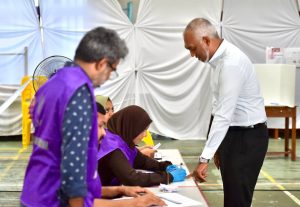Maldives President Mohamed Muizzu’s political party has swept parliamentary elections in a strong endorsement of his pro-China foreign policy, according to preliminary results reported Monday by local media.
The People’s National Congress won 70 out of 93 seats in Sunday’s vote, and along with three seats secured by its allies has taken absolute control of Parliament, according to the preliminary results.
The Maldivian Democratic Party, led by former President Ibrahim Mohamed Solih, who is seen as pro-India, held 65 seats in the previous Parliament but won only 15 seats, the news site Mihaaru.com reported.
Official results are expected later Monday.
The election was closely watched by regional powers India and China, which are competing for influence in the strategically located archipelago nation.
Muizzu’s election as president last year sharpened the rivalry between India and China as he took a pro-China stand and acted to remove Indian troops stationed on one of Maldives’ islets.
Sunday’s election was easier than expected for Muizzu, who had been expected to face a tough fight because some of his allies had fallen out and more parties entered the race.
Six political parties and independent groups fielded 368 candidates for the 93 seats in Parliament. The number of seats is six more than in the previous Parliament following adjustments for population growth.
Muizzu ran for president on a campaign theme of “India out,” accusing his predecessor of compromising national sovereignty by giving India too much influence.
At least 75 Indian military personnel were stationed in the Maldives and their known activities were operating two aircraft donated by India and assisting in the rescue of people stranded or faced with calamities at sea. Muizzu has taken steps to have civilians take over those activities.
Relations were strained further when Indian social media activists started a boycott of tourism in Maldives. That was in retaliation for three Maldivian deputy ministers making derogatory statements about Indian Prime Minister Narendra Modi for raising the idea of promoting tourism in Lakshadweep, India’s own string of islands similar to the Maldives.
India has fallen from being the top source of foreign visitors to Maldives to No. 6, according to Maldives government statistics.
Muizzu visited China earlier this year and negotiated an increase in the number of tourists and inbound flights from China.
In 2013, Maldives joined China’s “Belt and Road” initiative meant to build ports and highways to expand trade — and China’s influence — across Asia, Africa and Europe.

































